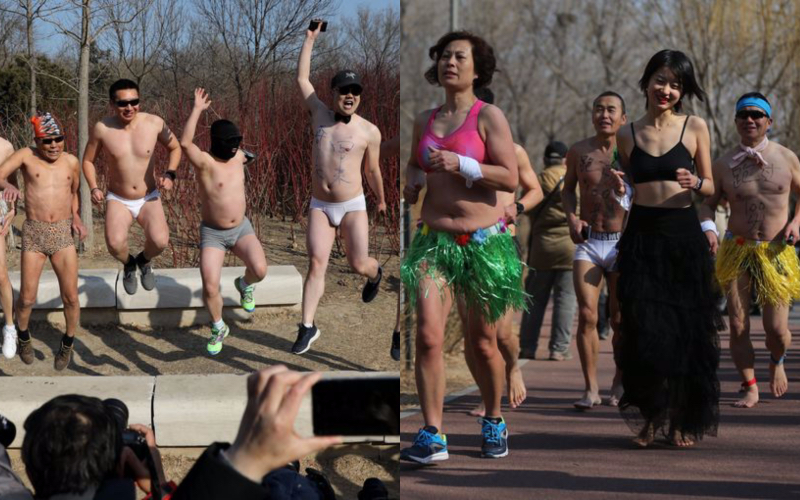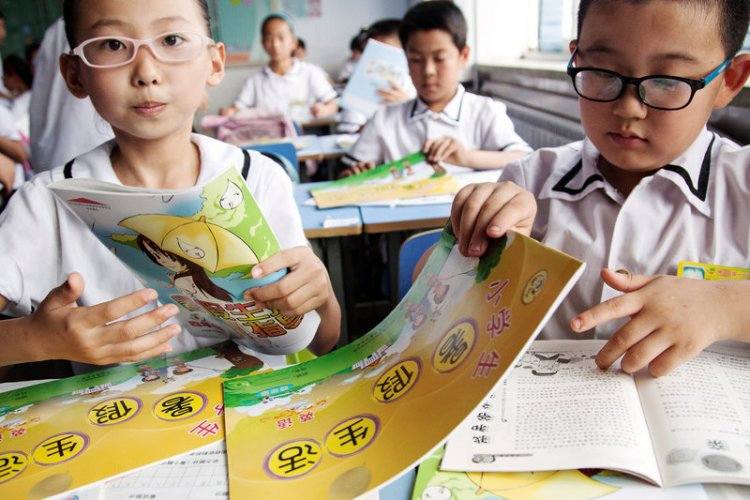Hopefully, the investment will include bins for dog droppings because it's bad for my neck to have to keep my eyes to the ground because most of the dog owners in the city neglect picking up after their pets unless it is in a heavily watched area.
Trending in Beijing: Underwear Run, 300 New City Projects for 2019, and Average National Salary
The fun, the strange, and the what-on-earth-is-this: a wrap-up of top stories in Beijing as told by the trending hashtags, local press, and general power of the internet.
1) Annual Beijing Underwear Run

The Underwear Run, also affectionately known as Undie Run, a loosely organized run that has been taking place in various cities around the world since the early '00s, has once again come to Beijing. Last Sunday, Feb 24, Beijingers defied the low temperatures, which barely scraped 6 degrees Celcius, and stripped down to their underwear for a 3.5km run in Olympic Forest Park. Some participants took the dress code seriously and ran in little more than a G-string or bra, while others dressed up in all manner of weird costumes such as pigs, pharaohs, or whatever else they found in their Halloween closet.
According to Sina English, the mission of the sprint was to promote "the idea of a natural and positive attitude toward life," although other sources claimed it was to raise awareness of environmental issues. Check out more pictures and videos of the event under the hashtag #2019北京奥森光猪跑# (2019 Beijing forest park naked pig run).
2) Beijing announces 300 projects planned for 2019

On Feb 27, the Beijing Municipal Commission of Development and Reform announced that the city is planning to execute 300 projects in 2019, an increase from last year's 276 projects. Amongst them, 100 are infrastructure projects, 100 high-end industrial projects, and 100 focused on improving people's livelihood. The long list includes Daxing Airport, construction of Beijing-Xiong'an new area railway, special bike roads, the connection between Capital and Daxing airports, and affordable housing buildings, among others.
Weibo occasionally surprises us with well thought out comments, and this post was no exception, with the most liked comment stating: "There are many hospitals but are there fewer blind (careless or unnecessary) prescriptions? There are a lot of nursing homes but are there fewer people dying at home? The investment in the facade is huge, but are people's lives really ok?"
3) The average monthly salary in China reaches RMB 6,014

Finance publication National Business Daily has released two graphs detailing increases in the workforce and salaries. According to the data, the average national salary among China's biggest cities has now reached RMB 6,014, with Shanghai taking a strong lead with an average RMB 8,389 per month. Surprisingly, Beijing doesn't even make the top 10, sitting behind cities like Tianjin, Chengdu, Nanjing, and Hangzhou. Other sources, however, claim that Beijing had the highest average monthly salary back in 2017, with a sizeable RMB 9,282.

Even though Beijing has not been crowned the highest-earning city this year, it ranked high on the number of job applications filed in the city after Spring Festival, coming second only to Shenzhen. Not great news for anyone on the hunt for a new job.
Netizens who commented under the hashtag #春节后全国平均薪资6014元# (The national average salary reaches RMB 6,014 after Spring Festival) were agitated by the numbers that in their opinion, do not reflect the real situation in the country: "There is no use in releasing the average numbers. It is better to talk about ranges: how many people are making RMB 1,000-3,000, RMB 3,000-5,000, and so on."
4) Kindergartens enrolment dropped by 740,000 in 2018

On Feb 26, the Ministry of Education released data regarding kindergarten enrolment in China, which show that it experienced a 3.82 percent decrease in admissions compared to the previous year. That translates to a huge 740,000 fewer children across the country. Director of the Development Planning Department, Liu Changya (刘昌亚), said that among other conclusions, this drop reflects a general trend of parents choosing to defer having children, or not have them at all.
Since the end of the one child policy, China has swung the other way, making great efforts to incentivize women to have more children. From wedding subsidies to scare campaigns admonishing the risks of giving birth later in life, the Party has its nose deep in family life. However, current tactics have proved unsuccessful and the birthrate is forecasted to hit record lows since 2000.
Netizens seemed less concerned with the issue. "It was the Year of the Sheep, that is why there are fewer kids attending kindergarten. Wait for the next year, it will go back up," hypothesized one user, referring to the fact that the children entering kindergarten in 2018 were likely to have been born in 2015, the Year of the Sheep, which is considered inauspicious and thus not a favorable year to have children. You can keep track of the ongoing discussion under the hashtag #2018幼儿园入学儿童锐减74万# (kindergartens in 2018 see 740,000 fewer entries).
READ: China's Birthrate Continues to Fall Despite Policy Changes
More by this author here.
Email: tautviledaugelaite@thebeijinger.com
Images: Weibo, USA Today







